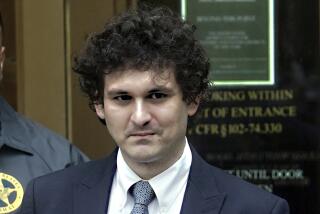BCCI Didn’t Run His Bank, Clifford Insists
- Share via
WASHINGTON — Clark M. Clifford, who created a legend as the man sought out in crises by presidents from Harry S. Truman to Jimmy Carter, fought to salvage his own reputation Wednesday in the scandal swirling around the Bank of Credit & Commerce International.
The white-haired lawyer swore to a skeptical congressional committee that he had no idea that the rogue bank owned a secret stake in First American Bankshares, where he spent nine years as chairman of the board until his forced resignation last month. He denied that BCCI had exerted any control over the Washington bank.
“At no time has any decision been made for First American by BCCI,” Clifford said, his voice rising in righteous indignation. “You have my word on it. I give you my word under oath.”
Clifford’s long defense was delivered at a crowded hearing before the House Banking, Finance and Urban Affairs Committee, whose members treated him with a measure of respect tinged at times with sad but unconcealed disbelief.
“My heart wants to believe you,” said Rep. Charles E. Schumer (D-N.Y.), near the end of the all-day hearing. “My head says no. There is just too much of a nexus between BCCI and First American to believe that the two aren’t inextricably linked.”
Rep. Toby Roth (R-Wis.) was more pointed, saying: “You have been in bed with BCCI for 10 years, and you’re telling us all you got was a back rub.”
The 84-year-old Clifford and his law partner and protege, Robert Altman, are subjects of criminal investigations by federal prosecutors in Washington and county prosecutors in New York. Federal banking regulators also are examining the two lawyers in connection with ties between First American and BCCI.
Clifford was chairman of First American’s parent company from 1982 until August, and Altman was its president. They were also lawyers for BCCI during the same period.
The central question in the investigations is whether Clifford and Altman misled banking regulators when they first said in 1981--and repeated over the years--that BCCI would have no control or influence over First American.
At Wednesday’s hearing, both lawyers protested that they had been fooled by BCCI’s alleged use of front men to hold at least 60% of the stock in First American’s parent company. If banking regulators in the United States and Britain could not discover the secret ownership until recently, they asked, how could they have known?
Altman, who fielded most of the questions from the congressmen, explained that he and Clifford consulted BCCI regularly about decisions at First American. But he said that was only because BCCI was the financial adviser to their Arab stockholders.
Yet Altman was confronted with a report by the Banking Committee’s Republican staff containing numerous documents suggesting stronger ties between BCCI and First American. Among the papers was a 1986 memo suggesting that the relationship between BCCI and First American’s parent company needed to be concealed from federal banking regulators. Clifford and Altman had sent the memo to the top two officers of BCCI, Agha Hasan Abedi and Swaleh Naqvi.
Altman, contending that the memo was prepared by outside lawyers and was being taken out of context, said that it referred only to specific state regulations regarding First American’s acquisition of National Bank of Georgia.
Were it not for Clark Clifford, the hearing would have been a footnote in the BCCI scandal. Evidence so far indicates that First American played no role in BCCI’s criminal activities. And there were no new disclosures on Wednesday.
Yet, since he joined Truman’s Administration in 1945 and went on to serve Presidents John F. Kennedy, Lyndon B. Johnson and Carter, Clifford has been at or near the center of much of American history. The story of how the ultimate Washington counsel came to need a lawyer has fascinated the town and written a new chapter on power-brokering in the nation’s capital.
More to Read
Inside the business of entertainment
The Wide Shot brings you news, analysis and insights on everything from streaming wars to production — and what it all means for the future.
You may occasionally receive promotional content from the Los Angeles Times.










